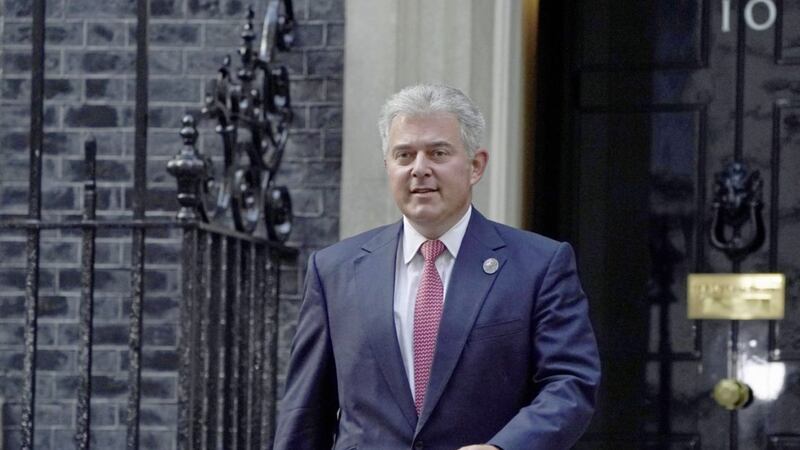This was the week the DUP was meant to collapse Stormont over the protocol and Sinn Féin was meant to collapse it over an Irish language act, yet their deadline arrived to shrugs on both sides. The real threat to devolution is government dawdling over the new law on Stormont stability.
The Westminster legislation, agreed in New Decade, New Approach, will extend the period the executive survives without one of its two largest parties from one week to six months. It finally passed the Commons this week but could take more months to go through the Lords, plus two further months to come into effect after enactment, making it useless before next May’s assembly election. This facilitates DUP and Sinn Féin grandstanding and leaves the way open to a collapse by accident.
All parties believe the legislation needs to be progressed carefully and none have accused the government of deliberate stalling. However, it is undeniable that taking things slowly helps the government to warn about political instability in Northern Ireland while wrangling over the protocol with the EU.
**
Belfast City Council’s controversial new business and standards committee has held its first meeting. The SDLP, Alliance, Greens and People Before Profit opposed the committee’s creation, claiming it allows Sinn Féin and the DUP to vet issues before they go before the full council and stitch up deals without public and media scrutiny.
Last week, Sinn Féin and the DUP had a row over lighting up Belfast City Hall but they can always work together in darkness.
**
GPs in Northern Ireland still have to pay their own medical indemnity insurance, two years after the NHS introduced a state-backed scheme for GPs in England and Wales.
The cost is typically £10,000 per year, which cannot be encouraging people to stay in the profession. Further discouragement comes from insurance ‘cliff edges’, where a part-time or locum GP cannot take on any more work because it is not worth extending their cover.
Stormont has just reallocated £230 million of unspent funds to health, with most earmarked for a pay deal. Chancellor Rishi Sunak has boosted Stormont’s budget by £1.6 billion, with most of that also expected to be spent on health. Putting a small fraction of these funds towards state-backed insurance would be as effective as a pay rise for GPs, while doing more to address our GP shortage.
**
Translink chief executive Chris Conway says choosing the new Glider route through north Belfast is not “an orange or green issue”. He is quite right. The issue is that none of the preferred routes extend into Glengormley, making them all worse than pointless. The swathe of suburbia beyond Belfast Zoo is linked to the city centre by direct buses, some using rush-hour motorway bus lanes. None of these journeys would be improved by having to change to a Glider half-way. As the new route is being funded by the Belfast city deal, cost is a poor excuse for this lack of ambition.
**
In 2006, direct rule Labour minister Lord Rooker effectively banned one-off new houses in the countryside via a planning policy known as PPS21. This caused an enormous fuss that particularly energised Sinn Féin, which accused the NIO of imposing “an English pattern of settlement on Ireland”. It used to be only Protestants who thought there were no towns before the plantation.
Now Sinn Féin is trying to recapture those heady 2006 days, judging by its gleeful attacks on SDLP infrastructure minister Nichola Mallon over a planning advice notice on one-off housing near farms.
Mallon has withdrawn the notice after objections, including from the DUP - but Sinn Féin is still making hay, leafleting cars outside mass about it in Co Armagh last weekend.
Are people who want to build a house in the countryside really such a significant constituency?
**
Queen’s University Belfast researchers have taken a strong position in the debate over opinion polling.
The researchers are involved in a Brexit project, whose latest survey showing 52 per cent support for the protocol made front pages this week.
They are using LucidTalk, Northern Ireland’s dominant commercial pollster. Its online panel method has been criticised for attracting only the ‘politically engaged’.
The researchers say this method “means that the survey is not based on systematic random sampling across Northern Ireland society. Instead, it is a reliable indicator of the opinion of Northern Ireland voters across the spectrum, who take an interest in current affairs and politics, and who are likely to exercise their right to vote.”
In other words, when it comes to determining what might happen in an election, surveying the politically engaged is fine.
**
Ulster University’s Belfast campus, already three years late and £100 million over budget, has fallen another year behind schedule.
This seems like a good time to mention a new bill in South Australia to cap university vice-chancellors’ salaries at the level of the region’s premier.
The proposed law has spooked vice-chancellors across Australia enough for them to offer to voluntarily “benchmark” their wages against the public sector.
Stormont’s first and deputy first ministers are paid £123,000 each, around one third the vice-chancellor’s salary at both Northern Ireland’s universities.









